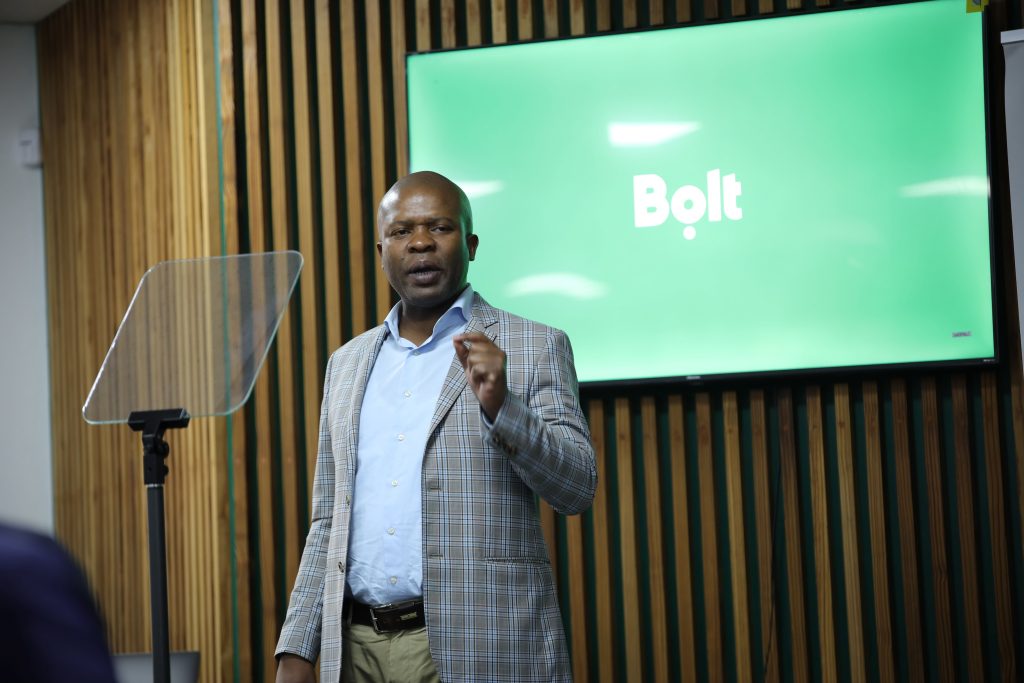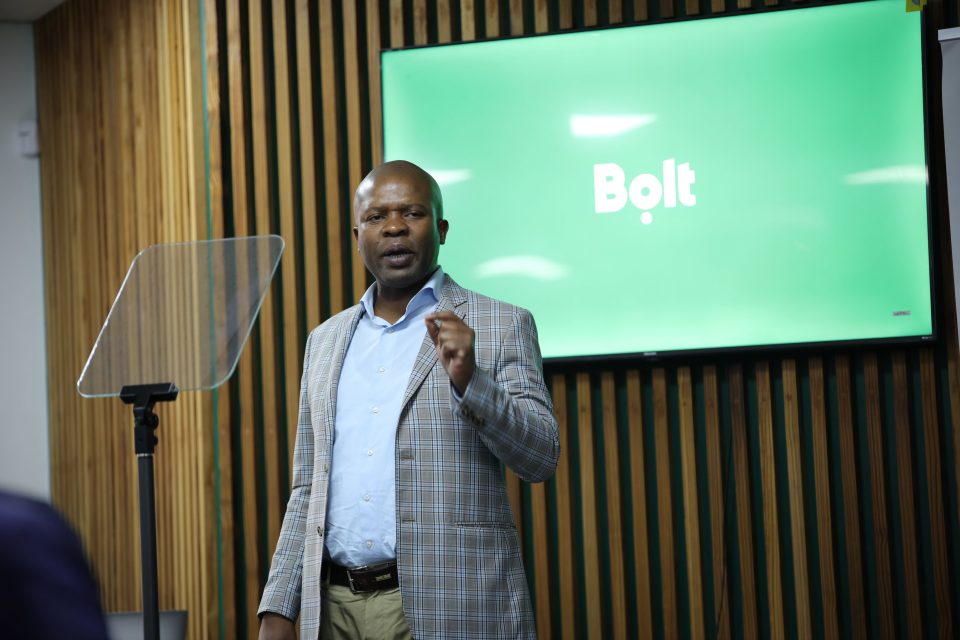
Nie Cele
Safe, reliable ride-hailing service available at the tap of a button, Bolt South Africa is serious about tackling and improving safety in the e-hailing industry.
This was evident when they recently launched and outlined a comprehensive Global Safety Campaign at their Headquarters in Randburg, Johannesburg.
The launch was also attended by the Indefatigable and painstaking, Gauteng MEC for Finance and Economic Development, Lebogang Maile, who applauded and fully endorsed the campaign.
“Gauteng Provincial Government commends Bolt South Africa for making safety a key priority as it deems safety in the e-hailing industry both a social and an economic imperative,” said Maile.
Also in attendance was Lyton Beard, Automobile Association (AA) who also spoke highly on this safety campaign.
Beard stressed that the more that 90 year old AA cares about the motoring public in South Africa.
“We care about all road users.Bolt is a very key element of the public transport and this gives us joy to be involved, This is a fantastic idea.”
“We are very excited. We ve been partnering Bolt for almost a year now for the safety of their drivers. This is good touch point and a good relationship between the two companies. Safety is very critical in everything we do. Bolt is great company and safety of their riders and drivers is very important and paramount.”
READ ALL ABOUT MAILE’S KEY NOTE ADDRESS BELOW.
MEC LEBOGANG MAILE DELIVERS KEYNOTE ADDRESS AT THE BOLT SOUTH AFRICA GLOBAL SAFETY CAMPAIGN LAUNCH
The Gauteng MEC for Finance and Economic Development, Lebogang Maile, delivered a keynote address at Bolt South Africa’s Global Safety Campaign launch in Johannesburg.
The campaign is aimed at improving safety in the e-hailing industry. Earlier this year, Women for Change released a report on the assessment of the current state of safety in e-hailing services in South Africa.
The report revealed concerning insights about the perception of safety in e-hailing services. A staggering 73 percent of users reported that they do not feel safe using e-hailing services.
The results also showed that 22 percent of respondents reported experiencing harassment or verbal abuse at least once during a trip, while 8 percent reported facing harassment often.
Furthermore, the responses revealed that 48 percent of participants knew someone who had been harassed or assaulted by a driver. These statistics highlight a critical issue in the e-hailing industry, emphasising the urgent need for improved safety measures to ensure user confidence and security. It is for this reason that Bolt’s Global Safety Campaign, and other initiatives by the company which aim to raise awareness of safety features, safety initiatives, and scaling preventative measures to prevent incidents of harassment and violence, are especially welcome in a South Africa that is battling the scourge of gender-based violence and femicide.
Gauteng, the most populous province in the country, with a population of over 15.1 million people, is necessarily an important place for the launch of this campaign. The province’s unique economic and demographic profile, which have a direct link to crime levels higher than the national average, make safety interventions crucial.
For this reason, the Gauteng Provincial Government commends Bolt South Africa for making safety a key priority as it deems safety in the e-hailing industry both a social and an economic imperative. Urban mobility is a serious issue in Gauteng and the African continent broadly. African cities are facing an unprecedented challenge of urbanisation.
In just 30 years, the number of cities in Africa has doubled. In 1990, there were 3,300 on the continent. By 2022, this number had increased to 7,600. According to Africa’s Urbanisation Dynamics 2022: The Economic Power of Africa’s Cities report published by the African Development Bank, the cumulative population of African cities has increased by 500 million people since 1990. Africa’s cities are the most rapidly growing cities in the world.
According to the United Nations World’s Cities in 2018 Data Booklet, the ten fastest-growing cities in the world are all located in Africa and the urban population will increase by around 900 million people by 2050. This growth, occurring in the context of rising levels of inequalities, has presented significant problems for African cities as they are growing fast and in sprawling ways that have resulted in the unequal provision of services, particularly transport.
A lack of financing, investments and infrastructure for sustainable public transportation has resulted in Africa having the highest rates of road fatalities in the world. This situation highlights a need for investment in sustainable urban mobility in Africa because cities play a crucial role in the growth and development of our economies.
Africa’s cities significantly outperform the countries in which they are located. The gap between the performance of African cities and the national averages is larger than in many other parts of the world. This is evidenced in the economic profile of Gauteng, the nerve-centre of the national and regional economy, contributing a third of South Africa’s total gross domestic product.
The centrality of cities in the growth and development on national economies has been established. Urban mobility is a significant component of this economic growth and development as the movement of both people and goods impacts the rate of increase in the real and nominal gross domestic product. In the context of South Africa, urban mobility is also a question of spatial inclusion.
The Gauteng City Region is geographically complex due to urbanisation as well as the persistent legacy of apartheid spatial planning.
The construction of the apartheid city, which we have inherited in the province, means that economic activities largely occur within the central business district and suburban areas within close proximity.
However, large density areas, mainly townships, hostels and informal settlements, have limited economic activity and economic opportunities. It is for this reason that the Gauteng Provincial Government adopted the Township Economic Development Act, which aims to facilitate and promote inclusive economic growth along a transformative paradigm.
The Gauteng Department of Economic Development has invested significantly in township development, using both financial and non-financial instruments to support the development of infrastructure and industries in townships.
The development of township economies is a sustainable path to spatial inclusion and our transformation efforts. Thus, the department views safety in mobility as a core priority not only for economic and spatial development, but for inclusion and transformation.
The Gauteng Department of Economic Development supports efforts to improve safety in the e-hailing industry and will continue to support initiatives by Bolt South Africa and the private sector broadly, to ensure the safety and security of users of e-hailing services.


